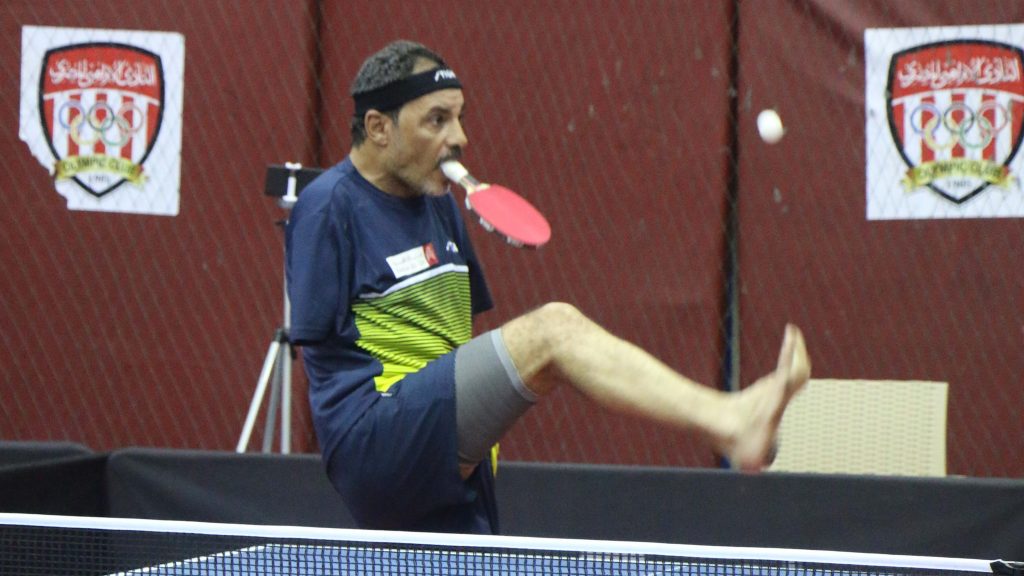"Our greatest glory," wrote Confucius, "is not in never falling, but in rising every time we fall." By this measure, Egypt's para table tennis star Ibrahim Hamadtou has lived a most glorious life. Now 45, a happily married father of three, Hamadtou's unlikely journey to the Paralympics began at age 10. "I was working as a carpenter in Damietta, so I would take the train to Damietta every morning," recalls Hamadtou of the day that changed his life forever. "I was standing by the door, and I fell in the gap between the train and the pavement. When I woke up from the coma, I found that both of my arms were amputated." The 10-year-old Ibrahim Hamadtou spent a year in self-exile at home, unable to stomach the "pity and sympathy" he saw in stranger's eyes. Slowly, however, he returned to playing with his friends. "I didn't play any sports before the accident, but when I visited the youth center, table tennis caught my eye," he says. "The first thing I tried was to hold the paddle under my armpits, but I failed. I tried this once, then twice, then the third time I placed the paddle in my mouth and I held the paddle between my teeth for a few moments, and then I thought, 'Why don't I try playing with my mouth?' "The next day I was at the youth center at 7:00 a.m. and that's where it all began," describes Hamadtou. "I've been playing table tennis since 1986, but I started playing on the world stage in 2015." Hamadtou's playing style truly has to be seen to be believed. Gripping the ball with his toes, he tosses the ball above his head and serves with all the side-underspin of Dimitrij Ovtcharov's signature backhand service. If the ball is even returned, the nimble Hamadtou is ready to whip his entire body at it, his muscular neck imparting a dizzying degree of topspin. Competing in the men's Class 6 division, Hamadtou gained international attention when he qualified for the 2016 Rio Paralympics. The boy who shunned the sympathy of strangers in his hometown of Kafr Saad, Egypt had grown into a man basking in their adulation, signing autographs with a pen in his mouth. In 2019, Hamadtou was the top seed in his division at the African Paralympic Qualifiers in Alexandria. "It will be a miracle for Ibrahim Hamadtou to qualify for two Olympic championships in a row," said Hamadtou, speaking in the third person, "and this can be a good end to my sports career. May God help me make this country proud." He seemed destined to qualify for back-to-back Paralympics until disaster struck. Hamadtou suffered a back injury early in the tournament which required hospitalization. Forced to withdraw, he was denied automatic qualification for Tokyo 2020. His dreams hung in the balance. In 2020, Ibrahim Hamadtou continued training as hard as ever. When the COVID-19 pandemic struck, he added yet another degree of difficulty to his routine by biting his racket handle while wearing a face mask. Now, Hamadtou's hard work has been rewarded with a bit of luck. The player who won a Class 6 ticket to the Paralympics in Hamadtou's absence has suddenly withdrawn from Tokyo 2020. The president of the African Table Tennis Federation, Khaled El-Salhy, described the selection process as follows: "In men’s Class 6, the winner, Abdelmagid Bashir Mahmoud of Egypt has been replaced by Ibrahim Hamadtou as the only African ranked player in men’s class 6." While no official reason was cited for Mahmoud's sudden withdrawal, Hamadtou and his many fans are certainly celebrating. "Personally, I am happy for Ibrahim Hamadtou," says Khaled El-Salhy. "As you remember he got injured during play in the 2019 African PTT Championships and went to hospital with no chance to continue the event in which he was the top seeded player. "It seems heaven’s justice was achieved for Hamadtou," continued El-Salhy. "To join the African group of qualifiers to Tokyo, I wish the best of luck." Thus, by the unlikeliest series of events, Ibrahim Hamadtou will take a victory lap at the 2021 Tokyo Paralympics after all. "I feel really happy playing table tennis," says Hamadtou. "I want to tell everybody that nothing is impossible and everybody should work hard for what you love and what you think is good for yourself. The disability is not in arms or legs, the disability is to not persevere in whatever you would like to do." Through faith, hard work and perhaps a little of "heaven's justice," Ibrahim Hamadtou has again achieved his greatest glory.
More at ITTF
